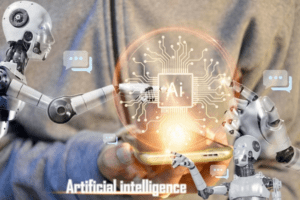Artificial Intelligence (AI): Revolutionizing Industries and Reshaping Our World
The domain of Artificial Intelligence (AI) is currently witnessing a seismic revolution, imprinting an enduring influence on the multifaceted dimensions of our existence and the diverse sectors within our society. From the realm of healthcare to the intricate world of finance, the expansive domain of transportation, and the arena of entertainment, AI is initiating a profound and unparalleled transformation in the way we lead our lives and perform our tasks. This technological revolution is giving birth to alterations of exceptional magnitude and far-reaching consequences. In the ensuing discussion, we shall embark on an exploration of the myriad methods through which AI is redefining the world, delving into the implications of these monumental changes.
A Revolution in the Healthcare Sector
 One of the most extraordinary realms where AI exercises profound influence is within the healthcare domain. AI algorithms are serving as invaluable companions to medical practitioners in the areas of disease diagnosis, prognosis, and the development of personalized treatment plans. Machine learning models, equipped with the ability to analyze vast reservoirs of medical data, ranging from patient records to diagnostic images, demonstrate an aptitude for detecting patterns and irregularities that might escape even the most discerning human physicians. Additionally, AI is leading a revolution in the field of pharmaceuticals by expediting the identification of potential drug compounds and predicting their efficacy.
One of the most extraordinary realms where AI exercises profound influence is within the healthcare domain. AI algorithms are serving as invaluable companions to medical practitioners in the areas of disease diagnosis, prognosis, and the development of personalized treatment plans. Machine learning models, equipped with the ability to analyze vast reservoirs of medical data, ranging from patient records to diagnostic images, demonstrate an aptitude for detecting patterns and irregularities that might escape even the most discerning human physicians. Additionally, AI is leading a revolution in the field of pharmaceuticals by expediting the identification of potential drug compounds and predicting their efficacy.
The proliferation of AI-driven robots and telemedicine platforms is progressively becoming the standard. Robots actively participate in surgical procedures, automate the execution of mundane tasks within medical facilities, and provide companionship to patients. Simultaneously, telemedicine channels empower patients to consult with medical professionals remotely, thus enhancing accessibility and convenience, particularly for those residing in remote or underserved regions.
The Transformation of Transportation
Artificial intelligence plays had an instrumental impact in reshaping the scene of transportation. Independent vehicles, directed by the intellectual prowess of artificial intelligence, have progressed from conceptualization to completion. Partnerships like Tesla and Waymo have expected spearheading jobs in the improvement of self-driving vehicles, a mechanical headway that vows to lessen mishaps, mitigate gridlock, and give versatile answers for those unfit to work a vehicle, like the old and truly tested people.
AI has also exerted a transformative influence on public transportation systems. Cities are harnessing AI for the optimization of traffic signals, reducing congestion, and streamlining public transport routes. This advancement not only enhances transportation efficiency but also contributes to environmental preservation by reducing carbon emissions, thus fostering a more sustainable future.
Enhancing Customer Interactions
 Business enterprises are harnessing the potential of AI to elevate the quality of customer experiences. Chatbots and virtual assistants are increasingly prevalent in the domain of customer service, delivering prompt and effective responses to customer inquiries. These AI-driven tools excel at managing routine customer interactions, allowing human agents to focus their efforts on addressing more intricate issues.
Business enterprises are harnessing the potential of AI to elevate the quality of customer experiences. Chatbots and virtual assistants are increasingly prevalent in the domain of customer service, delivering prompt and effective responses to customer inquiries. These AI-driven tools excel at managing routine customer interactions, allowing human agents to focus their efforts on addressing more intricate issues.
Moreover, AI assumes a central role in personalizing product recommendations, advertisements, and content. By discerningly analyzing user data and behavioral patterns, algorithms make suggestions regarding products and services that closely align with individual preferences. This transformation not only benefits businesses, resulting in increased sales but also enhances user satisfaction by rendering online experiences more relevant and enjoyable.
Advancements within the Financial Sphere
The financial sector has wholeheartedly embraced AI to enhance its operational efficiency. AI-powered algorithms are deployed for purposes such as fraud detection, risk assessment, and the facilitation of high-frequency trading. The latter, in particular, heavily relies on AI to analyze market data and execute transactions with lightning speed.
Furthermore, robo-advisors have emerged as a cost-effective means for individuals to manage their financial portfolios. These digital platforms employ AI to construct diversified investment portfolios that align with the user’s risk tolerance and financial objectives.
The Revolution in Education
 AI is steering a transformation in the realm of education, manifested through intelligent tutoring systems that provide personalized learning experiences, adapting to the unique needs and progress of students. These systems adeptly identify areas where students may face challenges and provide additional resources and exercises to expedite their progress.
AI is steering a transformation in the realm of education, manifested through intelligent tutoring systems that provide personalized learning experiences, adapting to the unique needs and progress of students. These systems adeptly identify areas where students may face challenges and provide additional resources and exercises to expedite their progress.
In addition to this, AI-facilitated language translation tools are effectively breaking down language barriers, and making educational content accessible to a global audience. This transformation holds the potential to democratize education, extending access to high-quality learning materials to individuals from diverse linguistic backgrounds.
Advancements in Agriculture
AI plays an indispensable role in agriculture, often referred to as precision agriculture. Artificial intelligence-fueled sensors and robots are utilized to screen yields and gather information connected with soil conditions, weather conditions, and bug invasions. This information fills in as an aide for ranchers, empowering them to go with informed choices concerning planting, water system, and collecting exercises, at last expanding proficiency and harvest yields.
Machine learning models are equally deployed in predicting crop diseases and optimizing the use of fertilizers and pesticides, thereby reducing the environmental impact. By harnessing the power of AI, the agricultural sector is advancing toward greater sustainability and productivity.
Creative and Artistic Excellence
 AI’s domain extends beyond logical and analytical pursuits; it is progressively expanding into the realm of creativity and artistry. Generative adversarial networks (GANs) possess the capability to produce art, music, and literature. AI can analyze vast datasets of existing art and generate entirely original pieces characterized by diverse styles. Performers are utilizing AI to make melodic pieces, and specialists are teaming up with AI to make outwardly charming magnum opuses.
AI’s domain extends beyond logical and analytical pursuits; it is progressively expanding into the realm of creativity and artistry. Generative adversarial networks (GANs) possess the capability to produce art, music, and literature. AI can analyze vast datasets of existing art and generate entirely original pieces characterized by diverse styles. Performers are utilizing AI to make melodic pieces, and specialists are teaming up with AI to make outwardly charming magnum opuses.
This combination of innovation and inventiveness has the potential to unearth new avenues for creative expression. It can surpass the boundaries of human creativity.
Assisting in the Battle Against Climate Change
AI actively partners in addressing one of the most pressing global challenges of our time – environmental change. It examines environmental data, improves weather forecasting, and assesses the impacts of climate change. Furthermore, AI optimizes the production and distribution of renewable energy. It tracks deforestation, identifies wildlife poaching, and streamlines waste reduction through intelligent recycling systems. By leveraging AI’s potential, we can make significant strides in mitigating the environmental consequences of human activities.
Ethical and Privacy Considerations
The promise offered by AI is accompanied by profound ethical and privacy considerations. The accumulation and analysis of extensive troves of personal data have raised concerns regarding data security and privacy. AI algorithms can inherit biases encoded in the data, potentially casting a shadow of bias over their insights. These biases may be unintentionally incorporated into the algorithms during the derivation of their insights.
Moreover, AI-driven job automation has raised unemployment concerns. This underscores the imperative need for workforce reskilling. Society must confront these challenges and establish ethical frameworks to ensure the responsible development and deployment of AI.
In Conclusion
AI is initiating profound and extensive transformations across the various dimensions of our existence and the sectors we inhabit. From healthcare and transportation to finance and education, AI is at the forefront of innovation and operational enhancement. It heralds a new era of creative expression while also actively tackling global challenges, including climate change.
Nevertheless, the tremendous power vested in AI necessitates an equally profound responsibility. Society must address the ethical and privacy concerns accompanying AI’s rise. It’s crucial to ensure that AI development aligns with our core values and priorities. As AI continues its evolution, the imperative is to strike a delicate balance. This balance involves harnessing its potential for the greater good while effectively mitigating its associated risks. In achieving this equilibrium, we can fully harness AI’s transformative potential. This will enable the creation of a more profound, interconnected, and sustainable world.
